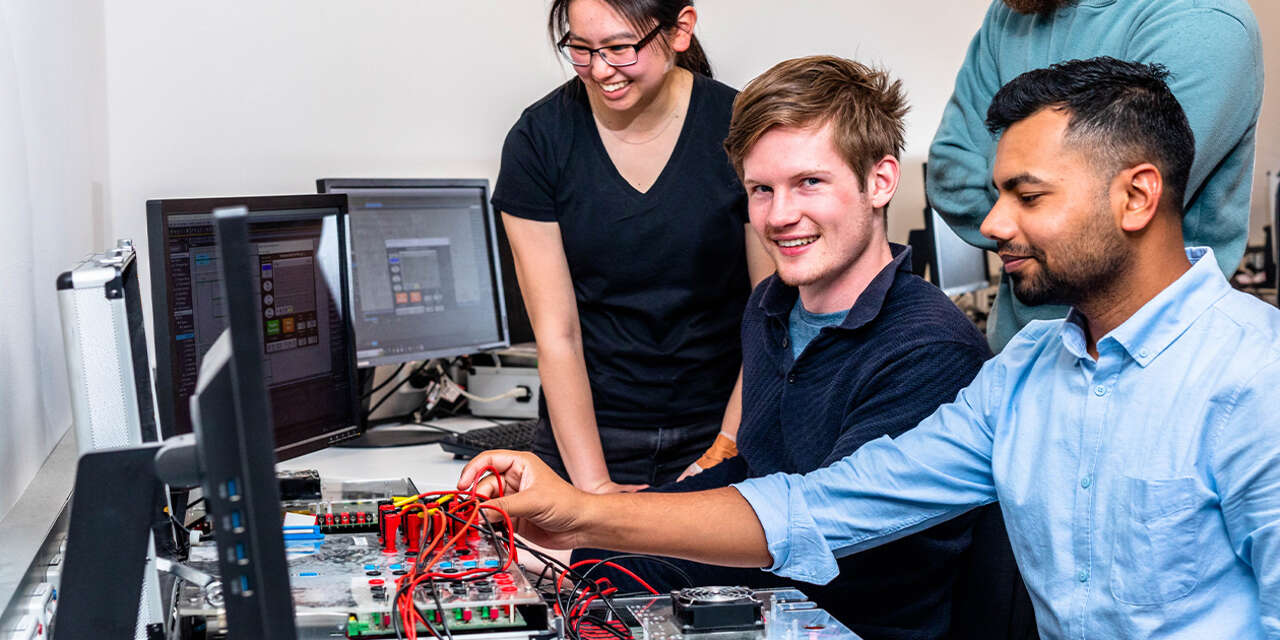Overview
Overview
Note that his course is a current major within the Bachelor of Engineering (Honours) degree; however, in 2026, this major will be superseded by the revised Electrical and Electronic Engineering major.
Advances in electronic communication, the Internet of Things (IoT) and renewable energy are increasing the diversity of career opportunities in electrical and computer engineering.
In this course, you will gain a thorough understanding of the concepts that underpin electrical and computer engineering. You'll then choose to specialise in one of three areas: Electronics and Communications, Power Systems or Embedded Systems.
In your final year, you’ll complete a major research or design project and 12 weeks of professional practice.
Power Systems
As the use of fossil fuels reduces, we must harness alternative sources of electrical energy, such as solar and wind.
This specialisation will help you address the challenges in the generation, transmission and distribution of electricity. It covers topics such as smart grids, distribution systems and the integration of renewable energy.
Electronics and Communications
Throughout society, the demand is growing for intelligent transportation systems, broadband access, remote operations and tactile internet – the next evolution of IoT.
This specialisation will help you address the challenges of telecommunication systems, to enable fast and reliable communication anywhere, anytime.
Embedded Systems
Our world is increasingly characterised by intelligent devices containing embedded systems that enable a computer to control, monitor and provide sophisticated functionality to another computer.
In this specialisation, you will learn the theoretical and practical aspects of embedded systems, sensors and electronic design.
Double degrees
You can extend your expertise and career opportunities by completing a double degree in Electrical and Computer Engineering and a Bachelor of Commerce (majors in Accounting, Economics, Finance and Management).
What jobs can the Electrical and Computer Engineering course lead to?
Careers
- Electrical engineer
- Electrical power engineer
- Electronics engineer
- Communications engineer
- Embedded systems engineer
- Medical systems engineer
- Network controller
- Power systems engineer
- Systems engineer
Industries
- Application engineering
- Computer hardware design
- Electronic systems
- Fibre optics
- Mobile communications
- Manufacturing and robotics
- Software development
- Solar and renewable energy
Further study
What you'll learn
- Demonstrate a conceptual understanding of fundamental science, mathematics, data analytics, information science, and computing underpinning the broad field of engineering, GC1
- Solve complex electrical and computer engineering problems of industrial and societal significance through the application of discipline-specific and integrated bodies of knowledge, design and sustainability principles, GC1
- Make decisions related to the design and implementation of solutions to engineering problems in a safe, ethical and climate-responsible manner adhering to legal and professional standards and through respectful partnerships with local First Peoples and other diverse cultures as globally responsible citizens, GC4, GC5
- Apply systems thinking for innovative solutions to global electrical and computer engineering challenges, discern knowledge and undertake applied research in a discipline of electrical engineering, GC2
- Select and use current and emerging technologies to develop and communicate effective and innovative engineering solutions to complex problems, GC3
- Demonstrate lifelong learning habits, teamwork and leadership abilities, and project management skills, and the ability to identify opportunities for career-wide professional growth, necessary for advancing a career in engineering and beyond, GC6

